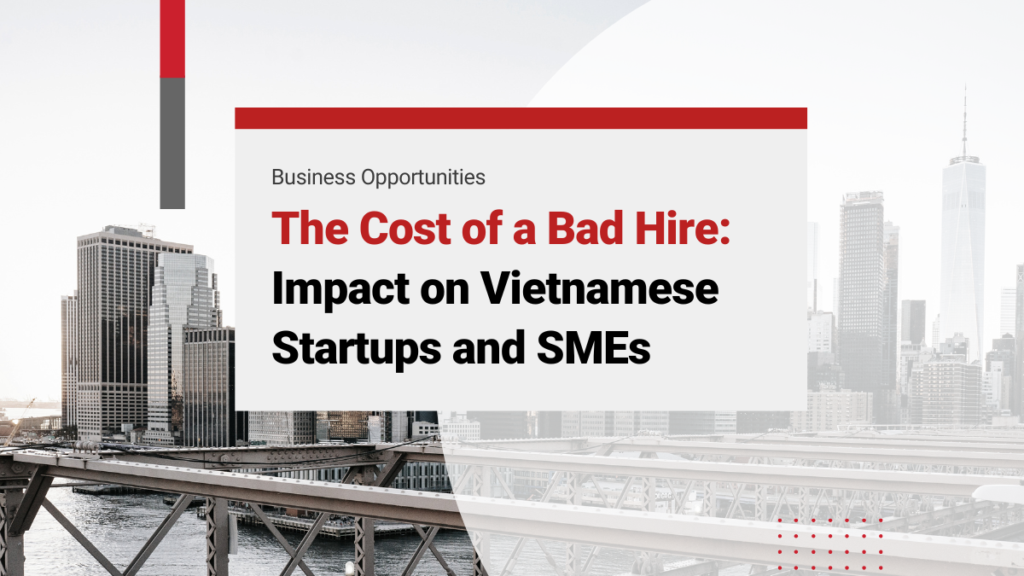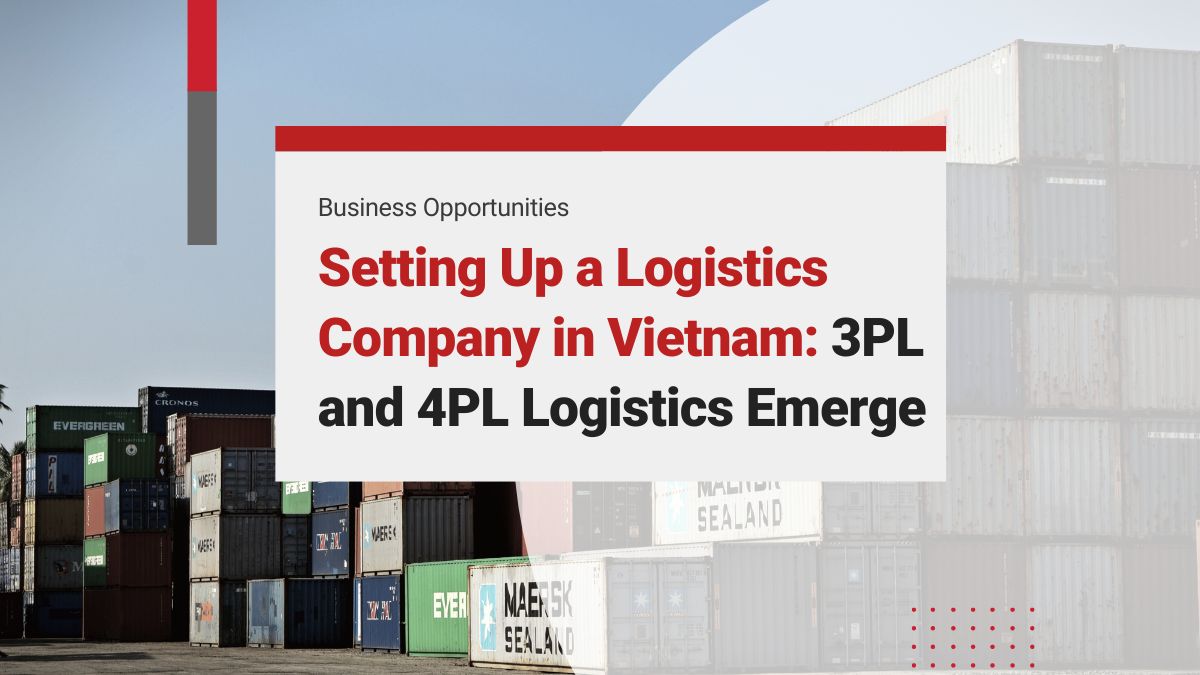From the moment a mismatched hire walks through the door, the cost of a bad hire begins to mount. As one HR expert notes, a bad hire “doesn’t just drain financial resources — it can disrupt team productivity, damage company culture, and even tarnish your brand’s reputation”. In other words, hiring the wrong person means wasted recruiting and training expenses and hidden fallout like project delays, unhappy customers, and low morale. For lean Vietnamese startups and SMEs, understanding the cost of a bad hire is crucial to staying profitable and productive. We’ll break down what this cost means in financial, operational, and cultural terms – and how to avoid it.
Financial Cost of a Bad Hire
For Vietnamese startups and SMEs, the cost of a bad hire can quietly erode both cash flow and growth potential. A typical hiring process may involve 5–15 million VND in job ads and marketing, while using a recruitment agency often adds a fee equivalent to 1–2 months’ salary. Once hired, onboarding and training can cost another 10–20 million VND in resources, supervision time, and productivity loss.
If the employee underperforms or leaves within 3–6 months — a common scenario in fast-moving sectors like tech or e-commerce — the business absorbs not only these upfront costs, but also several months’ salary, lost output, and additional expenses tied to rehiring. In total, one poor hiring decision can cost upwards of 50–100 million VND — enough to fund a key marketing push, open a satellite office, or hire two interns. For cash-conscious founders, these losses aren’t just operational setbacks — they’re missed opportunities to scale.
Check out InCorp Vietnam’s Employer of Record Services in Vietnam here!
Operational Impact and Productivity Loss
A bad hire rarely sits idle – their impact ripples through operations. The cost of a bad hire here shows up as missed deadlines, extra work for others, and stalled projects. Industry research finds that 36% of organizations see a drop in productivity due to a wrong hire. Imagine a small tech startup: one underperforming developer means other team members must cover code reviews and bug fixes. Projects get delayed and overtime rises, quietly draining employee energy and company resources.
When key positions remain unfilled or filled poorly, Vietnamese SMEs feel it quickly. For example, one HR study notes that for a small business, letting a position go vacant (or filled by a poor performer) for weeks can mean lost revenue and overworked staff. If a local manufacturer can’t find a competent line supervisor, production bottlenecks and late deliveries can cost contracts. Similarly, a retailer without a skilled manager may see customer service slip, losing sales.
Aside from immediate slowdowns, the broader picture is stark. Time and money spent retraining or scrambling to fill gaps often steal focus from growth. As one business blog warns, a hiring error can cost more than just salary – it can cost deals and customers. “Imagine bringing on a sales rep who fails to close deals for half a year… how many of those prospects became loyal customers of your competitors?”. In other words, a mis-hire in sales means missing out on revenue that might never return.
To summarize, operationally the cost of a bad hire is the slower execution and lost business that follow. Every delayed product launch or missed sale is part of that cost. In a fast-growing Vietnamese market, falling behind even by a few weeks can mean lost market share. For example, if a Hanoi software startup misses a government contract deadline because its team lacked an experienced developer, a competitor will fill the gap. Those lost contracts and shaken client trust translate into real financial losses for the SME.
Cultural and Morale Effects
The final dimension of the cost is human: impact on culture and morale. Even one hire who doesn’t fit can sour a positive work environment. In cultural terms, the cost of a bad hire can be measured in dropped morale, frayed trust, and higher turnover among good staff. According to a Forbes HR Council report, a bad hire can slash team morale by 30%. Managers report that bad hires often “don’t get along with others,” with 60% noting the negativity spreads through the team. That one toxic attitude or poor performer disrupts team cohesion, making others distrustful or disgruntled.
This cultural drag is costly. Lower morale means less creativity and more quitting. Surveys show about 29% of companies had top performers leave after a peer mis-hire created a toxic atmosphere. For a small Vietnam-based SME, losing even one skilled worker is disruptive – recruiting a new person and bringing them up to speed adds more delay and cost.
Outside the office, reputation damage is part of the bill. A mis-hire who deals with clients or the public can tarnish your brand. Negative reviews, missed service standards, or late deliverables make customers and partners wary. In tightly-connected local markets, news of a glitchy service or unhappy client spreads fast. For example, if a Saigon software consultancy hires a subpar project manager who mishandles a client, word may spread on industry forums or social media. That hurts future growth and leads to more hiring headaches.
In practice, then, the cultural cost of a bad hire is the damage to your team’s spirit and reputation. It may not appear on a spreadsheet, but it can derail the cohesion that fuels innovation. A startup that once celebrated small wins might find its momentum replaced by frustration. Because good morale and a strong culture drive productivity, the business feels the effect: disengaged employees work less effectively, compounding the financial and operational losses.
Impact on Growth and Productivity
All these factors – financial waste, operational drag, and cultural harm – converge to slow a company’s growth. For startups and SMEs, there is little room for error. Lost productivity and eroded morale directly stall expansion plans. A single hiring mistake can delay a go-to-market strategy or scare off investors. As one industry analyst warns, a wrong hire doesn’t just set you back financially – it “slows momentum, weakens morale, and steals opportunity”.
Consider a growing tech firm in Ho Chi Minh City: if their new developer underperforms, feature releases slip and time-to-market increases. Competitors can overtake them during that gap. Or a small exporter in Da Nang who hires a problematic logistics manager may start losing important clients to more reliable rivals. In each case, the cost of a bad hire extends beyond the direct spend; it is the lost growth that could have been achieved with the right team.
In Vietnam’s competitive environment, this impact is especially sharp. Rapidly developing sectors (like manufacturing or digital services) have tight schedules and big contracts. A missed deadline on a factory order or a delayed software rollout means a local firm misses out on market demand. Moreover, many Vietnamese SMEs rely on a few key clients: one bad hire affecting a client relationship can mean losing a big contract, which might represent a large fraction of revenue. In short, the cost of a bad hire is not just an accounting line – it can undermine the very growth engine of a small company.
Mitigating the Risk with Professional Help
Given these high stakes, many Vietnamese startups turn to professional support to avoid the cost of a bad hire. Local HR and legal factors – high turnover, side gigs (≈70% of young workers have second jobs), and evolving labor laws – make hiring complex. Outsourcing recruitment or HR can mitigate mistakes. InCorp Vietnam notes that professional HR consulting can “ensure the right people are hired and foster a positive environment”. HR experts understand both skills and cultural fit in Vietnam, and they help assess candidates on long-term commitment.
Why partner with a firm like InCorp? InCorp Vietnam offers end-to-end hiring and market-entry solutions tailored to SMEs. According to their resources, they provide “end-to-end recruitment solutions” – from executive search to contract staffing – helping companies find and retain the right talent. Their team understands Vietnamese salary benchmarks and labor regulations, so hiring is done efficiently and compliantly. In practice, this means your startup spends less time on trial-and-error and more time on growth.
InCorp is also a leader in one-stop company setup and outsourcing. Their experienced team handles company registration, compliance, payroll, and accounting, making your Vietnam expansion seamless. With these tasks outsourced, entrepreneurs can focus on building a strong team rather than paperwork. This means more time to define roles, screen candidates, and train new hires properly – all key to avoiding hiring mistakes. InCorp has supported over 20,000 clients across Asia Pacific, so their local knowledge can be a smart shortcut. For example, they help draft standardized contracts and onboarding schedules so new employees hit the ground running. Using InCorp’s expertise is an investment that pays off by lowering turnover and aligning hires with your long-term goals.
Read More: HR Outsourcing in Vietnam: Optimizing Operations for Business Success
Tips to Avoid the Cost of a Bad Hire
- Invest time in hiring. Don’t rush. Define roles clearly and screen candidates thoroughly. Use structured interviews and skills tests to reduce guesswork. The time you spend now on quality hiring drastically reduces future costs.
- Check fit carefully. Evaluate cultural fit as well as skills. Bad hires often struggle socially, so involve your team in the process. Understanding local work norms (like side gigs or family support) helps spot commitment issues early.
- Use probation and phased hiring. Consider trial contracts or probation periods to test a new hire’s fit before full commitment. If a mismatch becomes clear early, it saves months of wasted investment.
- Support new hires. Good onboarding and mentoring can turn a great hire into a superstar. Conversely, leaving a hire adrift increases the chance they become a “bad hire.” Act on any early warning signs of problems and provide training to bridge skill gaps.
- Perform a cost analysis. Tally up recruiting ads, staff time, training, and even client losses to quantify the cost of a bad hire. When you see this number, it becomes clear why an upfront investment in strong recruiting pays off.
- Leverage expert resources. Engage HR consultants or payroll partners. InCorp Vietnam’s services cover recruitment, payroll, and compliance – reducing the blind spots that lead to hiring errors. Their local knowledge lets you focus on business growth instead of labor headaches.
- Measure and adjust. Collect feedback on new hires’ performance and retention. Quantifying the cost of a bad hire from past mistakes will sharpen your future hiring strategy.
- Budget for hiring. View recruiting and training as investments, not just expenses. Allocating resources up front prevents paying the cost of a bad hire later.
- Monitor outcomes. Track retention and hiring results. Learning from each mistake – and its cost – helps you refine the process. Remember: spotting and fixing one bad hire early can save thousands in cost of a bad hire down the line.
Conclusion: The cost of a bad hire is more than a payroll line item. It represents lost growth, damaged culture, and stalled productivity – costs that Vietnamese startups and SMEs can ill afford. By following the tips above and seeking professional help, you can avoid these expensive mistakes. Firms like InCorp Vietnam offer HR and business setup services to help you recruit the right people and handle payroll and compliance. Investing in the right hires and partners now will spare you the hidden cost of a bad hire later. In short, for Vietnamese entrepreneurs, understanding and minimizing the cost of a bad hire can be a competitive advantage.
Need help with HR recruitment in Vietnam? Check out InCorp Vietnam’s HR & Payroll Services in Vietnam






